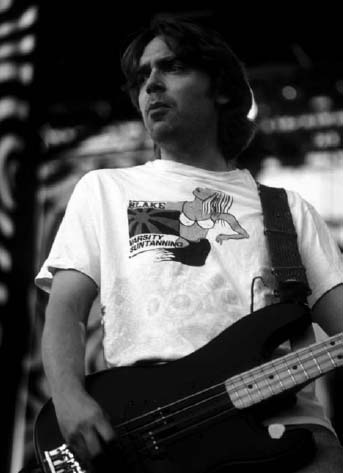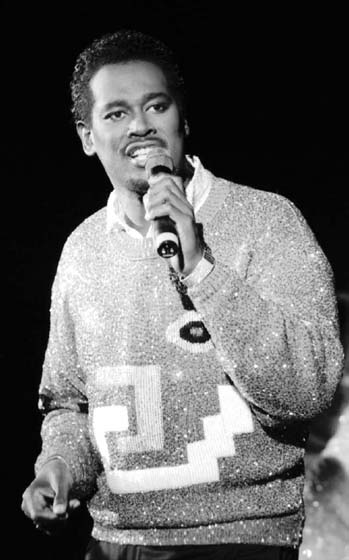The Encyclopedia of Dead Rock Stars (281 page)
Read The Encyclopedia of Dead Rock Stars Online
Authors: Jeremy Simmonds

When, in May 2004, Karl Mueller learned the devastating news that he was suffering from throat cancer, Soul Asylum rallied other bands (including a reformed Husker Du) to raise funds for his treatment. Despite going into remission, Mueller was to die from his condition a year later. The bassist is best remembered via the exotically titled Soul Asylum album
Say What You Will, Clarence - KarlSold the Truck
(1984). The band returned with a new album,
Crazy Mixed Up World,
in 2006, the last record to feature a man who had given this enduring Twin Cities group almost twenty-five years’ loyal service.

Karl Mueller: Soul brother
JULY
Golden Oldies #26
Renaldo ‘Obie’ Benson
(Detroit, Michigan, 14 June 1937)
The Four Tops

Best recalled as the bass within the legendary Four Tops, Renaldo ‘Obie’ Benson was perhaps the most talented member of the group; as well as possessing that great voice, he was also a fine songwriter and choreographer for The Tops - or The Four Aims, as they were originally known. Benson and high-school buddy Lawrence Payton met Levi Stubbs and Abdul ‘Duke’ Fakir at a party in 1953, the four dropping the name ‘Aims’ (for fear of confusion with The Ames Brothers) as they signed with Chess Records. Failure here was perhaps a happy accident: it took until 1964 for The Tops to bed themselves in at Motown, the group then presenting Berry Gordy with a series of sparkling hits - particularly between 1964 and 1970 - including the classic chart-toppers ‘I Can’t Help Myself’ (1965) and ‘Reach out I’ll be There’ (1966 - also a UK number one). His distinctive nickname no more than the combination of the final syllable of his first name with the first of his surname, ‘Obie’ Benson achieved a major critical triumph with ‘What’s Going On’, the song he co-wrote with Marvin Gaye, now widely regarded as one of the greatest of all time.
‘He put a smile on everybody’s face.’
‘Duke’ Fakir, a surviving Top
The Four Tops maintained an unbroken line-up until the death of Lawrence Payton
( June 1997),
June 1997),
which proved something of a watershed for a group still performing regularly. ‘Obie’ Benson made his final appearance with The Four Tops on the
Late Show with David Letterman
just months before his death from cancer on 1 July 2005. The bass singer was replaced by Payton’s son, Roquel.
See also
Levi Stubbs ( Golden Oldies #77). Later trumpeter/musical director George Rountree (d 2011) has also passed on.
Golden Oldies #77). Later trumpeter/musical director George Rountree (d 2011) has also passed on.
Friday 1
Luther Vandross
(New York City, 20 April 1951)

The first day of July 2005 saw another, rather different legend of R & B pass away. For his part, Luther Vandross seemed more about style than passion, his recordings epitomizing the smooth, high-production values foisted upon soul music in the eighties. Vandross spent most of his childhood in the Bronx, one of a musical family that had also produced his elder sister Patricia, a singer with The Crests of ‘Sixteen Candles’ fame. Inspired by his sibling – whose record almost reached number one at the time of their father’s death in 1960 – Vandross vowed to make music his world as well, joining a group while still at high school, and earning vocal and production credits as a teenager. Mainly a backing singer in his early career, Vandross – when he wasn’t making jingles for Kentucky Fried Chicken – recorded with a number of impressive names, including Quincy Jones, Roberta Flack, Carly Simon and, perhaps surprisingly, David Bowie, who invited the singer to tour with his 1974 ‘Diamond Dogs’ show and back him on the
Young Americans
album (1975). A major breakthrough came when the group Change invited Vandross to sing the international hit ‘Searching’ (1980), but the singer was in his thirties before he could boast a platinum album of his own. The age factor was clearly one that Vandross turned to his advantage, however, his audience largely middle-class, thirty-something couples who lapped him up, as they did rivals like Al Jarreau, Alexander O’Neal and particularly Freddie Jackson, with whom Vandross was said to have had a somewhat terse relationship. (The singer himself regularly ducked questions regarding his sexuality: he never married, nor sired any children, and was seldom paired with anyone.) It was in a live environment that Vandross was to thrive, since remarkably, although he sold 25 million records, he never managed a number-one hit in either America or Britain – his biggest singles being the duets ‘The Best Things in Life are Free’ (1992) with Janet Jackson, and ‘Endless Love’ (1994) with Mariah Carey. One of his last studio albums, the highly personal
Dance with My Father
(2003), reached the summit at home, however. From this came a 2004 Song of the Year Grammy for the title track (co-written by Richard Marx, another favourite with women of a certain age).
This triumph, one of eight Luther Vandross earned in his time, was to be his last. Suffering from hereditary diabetes that caused his weight to fluctuate dramatically, the singer experienced the deaths of several family members ahead of his own. A stroke in 2003 having weakened him, the singer developed pneumonia and underwent a tracheotomy. Finally, surrounded by his family at the John F Kennedy Medical Center in New Jersey, he passed away. Vandross was interred near by, at George Washington Memorial Park.
‘A boy so mellow, so powerful; a boy of rare, rare vintage.’
The Reverend Jesse Jackson

Luther Vandross: Presumably the aunt who bought him the sweater was in the audience
GoldenOldies #27
Raymond Davis
(Sumter, California, 29 March 1940)
The Parliaments/Parliament/Funkadelic
(Zapp)
(The Temptations)

The youngest of twelve kids, Ray Davis was an original bass vocalist with harmony group The Parliaments, who scored a Top Twenty hit with ‘(I Wanna) Testify’ (1967) - inadvertently contributing to one of the great musical phenomena of the last fifty years. The group was fashioned by the irrepressible George Clinton, who oversaw their transition into ‘Parliament’ (and the overlapping Funkadelic), a larger-than-life funk amalgamation that produced some of the most blistering and futuristic sounds/images black music had yet witnessed (a clear influence upon current acts like OutKast). Davis’s smouldering tones can be heard on P-Funk greats like ‘Tear the Roof off the Sucker’ (1975) and ‘One Nation under a Groove’ (1978).